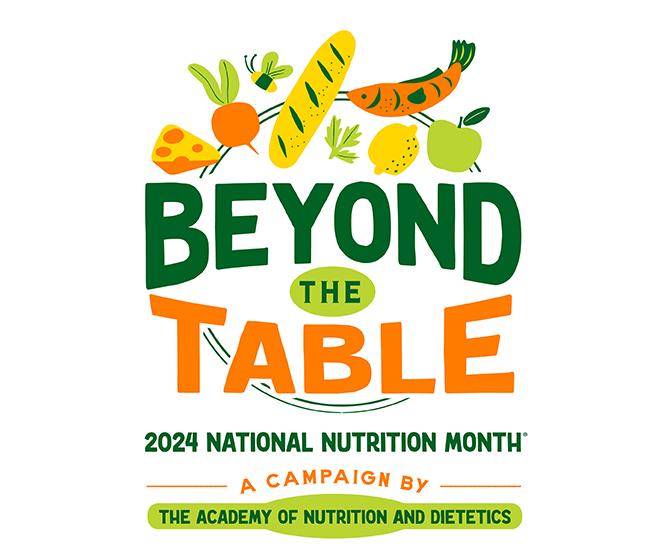March is National Nutrition Month®
 This year’s theme for National Nutrition Month® inspires us to look Beyond the Table when thinking about our health and the environment. Choices we make daily, including what we’re going to eat and drink, can make a big difference — both now and in the future. School and family meals are important, but healthy choices go beyond the foods and drinks we enjoy while sitting at the lunch or dinner table. They include our snacks, breakfasts on the go, eating out with friends, and even where foods are grown and how they’re prepared.
This year’s theme for National Nutrition Month® inspires us to look Beyond the Table when thinking about our health and the environment. Choices we make daily, including what we’re going to eat and drink, can make a big difference — both now and in the future. School and family meals are important, but healthy choices go beyond the foods and drinks we enjoy while sitting at the lunch or dinner table. They include our snacks, breakfasts on the go, eating out with friends, and even where foods are grown and how they’re prepared.
Our food choices also can affect the health of our planet. Have you ever thought about the work that goes into producing the foods we eat? This includes how food is grown or raised, where and how it is made, as well as its safety. It’s important to think about the foods we eat and the nutrition they provide, but is there more we could be doing to improve our health and the environment? Learn what’s involved in growing your food! There are many ways you can learn about how your food is produced. Visit a local farm or farmers market and talk with the people who are growing and harvesting your food. Many farmers and food producers will be happy to answer your questions, let you sample products or provide recipes for foods that are new to you. Some local farms even have tours, so people can see how they operate.
You also can grow your own fruits and vegetables at home. Want to try gardening but have limited space? Grow herbs or lettuce indoors. Tomatoes, peppers, or strawberries may work, too, if you have a patio or porch with enough sunlight. Schools, churches, and other places may offer community gardens where you can participate in the growing process and share in the harvest. Not quite ready to get your hands in the dirt? Many local farms offer programs, which include “farm shares” of produce during a growing season or you can shop your local farmers at your local farmer’s market.
Supporting farmers by buying locally grown and seasonal foods can help you eat with the environment in mind. Other steps include decreasing food waste at home by creating new dishes from leftovers or by composting. You also can add more plant-based foods to your meals and snacks. National Nutrition Month® is a great time to start thinking about how you can go Beyond the Table to improve both your health and the planet’s.
'Beyond the Table' Lunch and Learn
Join us March 14th at 12:00 pm! Come learn more about the benefits of eating farm-to-fork and how we can make mindful decisions about our daily nutrition choices that have a positive impact on our bodies and the environment. A cooking demonstration and tasting will be included in this class. This event is free but registration is required. Register Here
Source: American Academy of Nutrition and Dietetics
